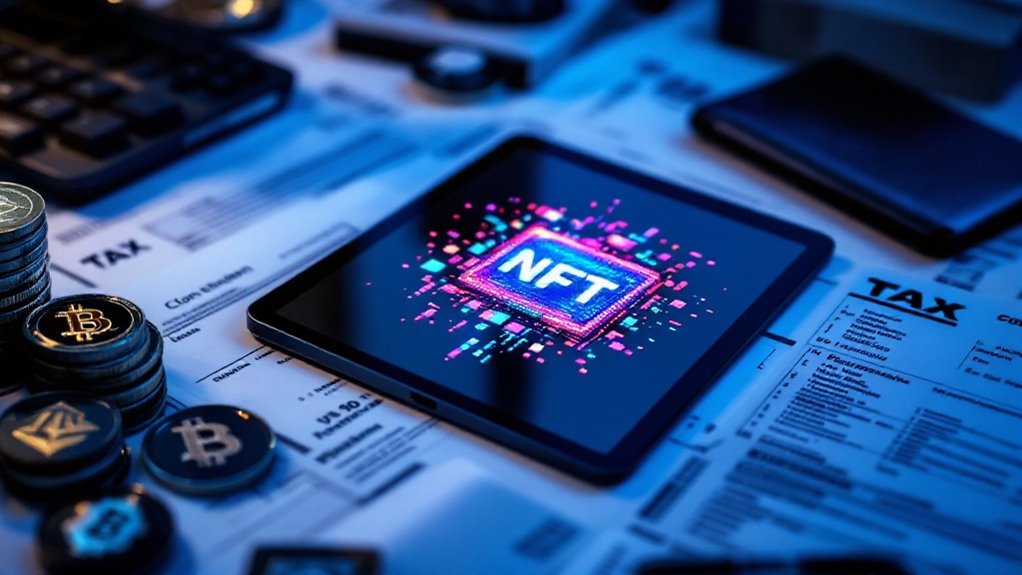NFT taxation operates under property and capital gains rules, with unique twists for digital assets. Creators must report sales as ordinary income, while collectors face capital gains taxes based on holding periods. Each transaction triggers tax events, from minting to trading, with gas fees included in cost basis calculations. Short-term gains see higher rates up to 37%, while long-term holdings enjoy lower rates after one year. The evolving NFT landscape demands careful attention to maximize tax efficiency and avoid costly surprises.

While the explosive growth of NFTs has created exciting opportunities for digital artists and collectors, it has also introduced a complex web of tax implications that many participants never anticipated. The IRS currently treats NFTs as property, similar to cryptocurrency, subjecting them to capital gains tax when sold or traded. Like precious gems scattered across the digital landscape, these virtual assets glitter with promise but come wrapped in layers of tax obligations that can catch the unwary by surprise.
The tax implications ripple through every stage of an NFT's journey. When collectors purchase NFTs using cryptocurrency, they trigger not one but two taxable events – the disposal of the crypto and the acquisition of the NFT. Artists who mint and sell NFTs must report their proceeds as ordinary income, while collectors who flip digital art for profit face capital gains taxes that vary based on their holding period. Gas fees affect the total cost basis of NFT transactions, making accurate expense tracking essential for tax compliance. Creators operating as businesses must report their NFT income on Schedule C of their tax returns. Similar to DeFi activities, staking rewards from NFT protocols are treated as ordinary income and must be reported upon receipt.
The digital marketplace hums with activity, but each transaction leaves a trail that the IRS expects to follow. For investors traversing this new terrain, understanding their tax obligations feels like decoding an ancient scroll written in modern code. Short-term gains face steep rates of up to 37%, while patient collectors who hold their NFTs for more than a year might qualify for lower long-term rates.
Some NFTs may even be classified as collectibles, subject to a special 28% tax rate that echoes traditional art market regulations. The challenge of determining fair market value adds another layer of complexity to NFT taxation. Unlike traditional assets with established pricing mechanisms, NFTs dance to their own rhythm in a rapidly evolving marketplace.
Smart collectors keep meticulous records of their transactions, tracking everything from purchase prices to gas fees. Tax-loss harvesting has emerged as a popular strategy, allowing investors to offset gains with strategic losses, while donations of appreciated NFTs might offer unexpected tax benefits. As this digital art revolution continues to unfold, the tax landscape shifts like sand beneath our feet, requiring constant attention and adaptation from all participants in the NFT ecosystem.
Frequently Asked Questions
How Do NFT Gifts to Family Members Affect My Tax Obligations?
Gifts of NFTs to family members under $18,000 annually require no tax reporting. Larger gifts count against lifetime exemption and need Form 709 filing. Recipients inherit original cost basis for future sales.
Can I Deduct Losses From Failed NFT Minting Attempts?
Failed NFT minting costs may be deductible as capital losses up to $3,000 annually against ordinary income if documented properly. Professional creators can potentially claim business expense deductions on Schedule C.
What Tax Implications Arise When Trading NFTS Across Different Blockchains?
Cross-chain NFT trades trigger capital gains taxes upon disposal of original NFTs. Traders must establish new cost bases, track valuations across blockchains, and may face double taxation risks if transactions aren't properly documented.
Are Gas Fees Included in the Cost Basis of NFTS?
Gas fees are generally included in the NFT's cost basis when calculating capital gains or losses. These transaction costs add to the purchase price and can be tracked alongside the NFT's acquisition value.
Do International NFT Transactions Require Special Tax Reporting Procedures?
International NFT transactions require special reporting through FBAR and FATCA regulations. Cross-border sales must document currency conversions, comply with foreign tax laws, and address potential double taxation across multiple jurisdictions.









